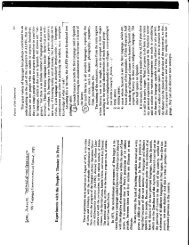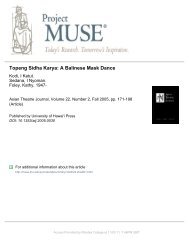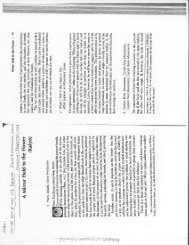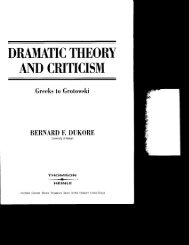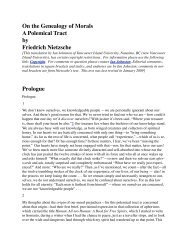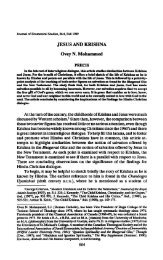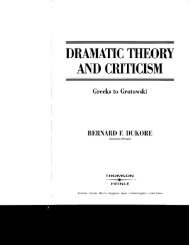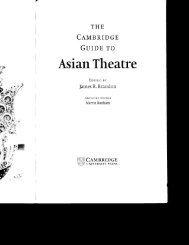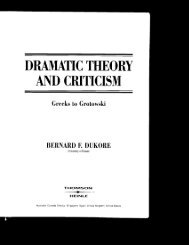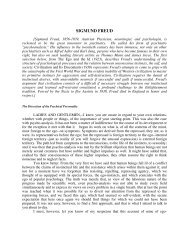Contrary Notions of Identity in As You like It - Yavanika
Contrary Notions of Identity in As You like It - Yavanika
Contrary Notions of Identity in As You like It - Yavanika
You also want an ePaper? Increase the reach of your titles
YUMPU automatically turns print PDFs into web optimized ePapers that Google loves.
240<br />
IDENTITY IN AS YOU L IKE IT<br />
The company seem to have realized this fact and have taken Touchstone's<br />
words to heart, for they respond to Hymen's song with a litany<br />
<strong>of</strong> Ifs (V.iv. 118-24). Hav<strong>in</strong>g renounced the absolute <strong>in</strong> favor <strong>of</strong> the<br />
relative, the exclusive self <strong>in</strong> favor <strong>of</strong> the <strong>in</strong>clusive, the lovers are prepared<br />
for marriage, the ultimate <strong>in</strong>stance <strong>of</strong> the <strong>in</strong>clusiveness <strong>of</strong> identities.<br />
Hymen pairs <strong>of</strong>f the couples and s<strong>in</strong>gs a paean to "High<br />
Wedlock" (V.iv.146) which rem<strong>in</strong>ds us that "'Tis Hymen peoples<br />
every town"-that without the "blessed bond <strong>of</strong> board and bed"<br />
(V.iv. 142-143), this union <strong>of</strong> <strong>in</strong>clusive selves (united also at the biological<br />
level), we would not exist. The play's f<strong>in</strong>al scene thus argues for<br />
the necessary priority <strong>of</strong> the <strong>in</strong>clusive self, without which there would<br />
be no society, and ultimately, no cont<strong>in</strong>uation <strong>of</strong> life. This argument<br />
is recapitulated at the end by the f<strong>in</strong>al dispensation <strong>of</strong> the antagonists,<br />
which reiterates - and, moreover, embodies -the <strong>in</strong>clusiveness <strong>of</strong> the<br />
play's guid<strong>in</strong>g spirit.<br />
<strong>As</strong> the play ends, the news arrives that Duke Frederick, the play's<br />
highest rank<strong>in</strong>g embodiment <strong>of</strong> the closed self <strong>of</strong> hatred, has been<br />
converted (rather than killed, as <strong>in</strong> Lodge), and Jaques, the play's<br />
chief exponent <strong>of</strong> the satiric vision <strong>of</strong> human be<strong>in</strong>g, realizes that "out<br />
<strong>of</strong> these convertites / There is much matter to be heard and learned"<br />
(V.iv. 184-85) and gracefully retires. Thus <strong>in</strong> Touchstone's speech<br />
and marriage, Frederick's conversion, and Jaques's humble withdrawal,<br />
as well as <strong>in</strong> Oliver's conversion, the play's exclusive and<br />
satiric elements submit to the more <strong>in</strong>clusive and magnanimous<br />
agents <strong>of</strong> Shakespeare's romantic comedy; and we the audience participate<br />
<strong>in</strong> a perspective from which life-our very be<strong>in</strong>g-is experienced<br />
as a process which, although <strong>in</strong> certa<strong>in</strong> ways exclusive, is<br />
fundamentally a matter <strong>of</strong> openness and <strong>in</strong>clusion.<br />
This content downloaded on Thu, 7 Mar 2013 13:10:36 PM<br />
All use subject to JSTOR Terms and Conditions



